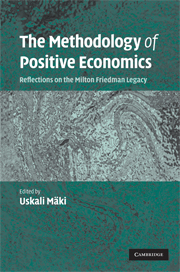Book contents
- Frontmatter
- Contents
- List of figures
- List of tables
- Contributors
- Preface
- Part 1 The classical essay in twentieth-century economic methodology
- Part 2 Reading and writing a classic
- Part 3 Models, assumptions, predictions, evidence
- 4 The influence of Friedman's methodological essay
- 5 Did Milton Friedman's positive methodology license the formalist revolution?
- 6 Appraisal of evidence in economic methodology
- 7 The politics of positivism: disinterested predictions from interested agents
- Part 4 Theoretical context: firm, money, expected utility, Walras and Marshall
- Part 5 Concluding perspectives
- Index
6 - Appraisal of evidence in economic methodology
Published online by Cambridge University Press: 02 December 2009
- Frontmatter
- Contents
- List of figures
- List of tables
- Contributors
- Preface
- Part 1 The classical essay in twentieth-century economic methodology
- Part 2 Reading and writing a classic
- Part 3 Models, assumptions, predictions, evidence
- 4 The influence of Friedman's methodological essay
- 5 Did Milton Friedman's positive methodology license the formalist revolution?
- 6 Appraisal of evidence in economic methodology
- 7 The politics of positivism: disinterested predictions from interested agents
- Part 4 Theoretical context: firm, money, expected utility, Walras and Marshall
- Part 5 Concluding perspectives
- Index
Summary
Though not the only topic of Milton Friedman's “Methodology of positive economics” (F53) the subject of this chapter is a very important theme of that essay. To understand the influence of that essay it is necessary to view it as a section of a major thread in the history of economic thought. The thread is more easily identified than characterized precisely: starting with Adam Smith's The Wealth of Nations and after making juncture with Utilitarianism, the thread emerged in the late nineteenth century as neo-classical economics and after much further elaboration has become (in the late twentieth century) strongly associated with new classical economics. The thread identifies with what Schumpeter (1954) called a preanalytic vision or, alternatively, a particular frame for perceiving the functioning of an economy. Let us call this frame “The Invisible Hand.”
Two dominant characteristics of the frame are an emphasis upon (i) the advantages of specialization and division of labor and (ii) the role of voluntary exchange in facilitating their achievement. Following the thread and the associated frame is one way of organizing a history of economic thought and it is in this context that I interpret F53. In short, I consider F53 to be an important part of a long intellectual tradition that has undergone intermittent and continuing change without losing its essential character.
Notoriously F53 has been subject to differing interpretations. The one offered here has been partly anticipated in the literature, though it may contain some new wrinkles. However, I am not sure on the latter point and make no claims to originality.
- Type
- Chapter
- Information
- The Methodology of Positive EconomicsReflections on the Milton Friedman Legacy, pp. 165 - 188Publisher: Cambridge University PressPrint publication year: 2009
- 2
- Cited by



